-
01-01-2015
Tecnologias em saúde para análise espacial e diagnóstico situacional dos territórios: contribuições para a enfermagem
Revista Brasileira de Enfermagem. 2015;68(6):999-1000
Abstract
Tecnologias em saúde para análise espacial e diagnóstico situacional dos territórios: contribuições para a enfermagem
Revista Brasileira de Enfermagem. 2015;68(6):999-1000
DOI 10.1590/0034-7167.2015680601i
Views0Para a constituição de uma base organizativa dos processos de trabalho na Atenção Primária à Saúde em direção a uma nova prática social é importante o reconhecimento dos territórios e seus contextos, pois estes materializam as interações humanas, os conflitos, os problemas de saúde e necessidades humanas. Nesse processo de reconhecimento e diagnóstico situacional dos […]See more -
01-01-2015
Health technologies for spatial analysis and situational diagnosis of the territories: contributions to nursing
Revista Brasileira de Enfermagem. 2015;68(6):999-1000
Abstract
Health technologies for spatial analysis and situational diagnosis of the territories: contributions to nursing
Revista Brasileira de Enfermagem. 2015;68(6):999-1000
DOI 10.1590/0034-7167.2015680601i
Views0In order to establish an organizational basis for work processes in primary health care geared towards a new social practice, it is important to recognize territories and their contexts, as these materialize human interactions, conflicts, health problems and human needs.In the process of recognition and situational diagnosis of territories, technologies for spatial analysis can facilitate […]See more -
01-01-2015
CARTA DE FORTALEZA PARA A ENFERMAGEM BRASILEIRA
Revista Brasileira de Enfermagem. 2015;68(5):961-962
Abstract
CARTA DE FORTALEZA PARA A ENFERMAGEM BRASILEIRA
Revista Brasileira de Enfermagem. 2015;68(5):961-962
DOI 10.1590/0034-7167.2015680527
Views0APRESENTAÇÃOOs participantes do 18º Seminário Nacional de Pesquisa em Enfermagem (SENPE), promovido pela Associação Brasileira de Enfermagem (ABEn) e realizado pela ABEn Seção Ceará, aprovaram, em Sessão Plenária de Encerramento, no dia 03 de junho de 2015, a “Carta de Fortaleza para a Enfermagem Brasileira”. A ABEn vem a público divulgá-la, ao mesmo tempo em […]See more -
01-01-2015
Delayed surgical recovery: a concept analysis
Revista Brasileira de Enfermagem. 2015;68(5):953-960
Abstract
Delayed surgical recovery: a concept analysis
Revista Brasileira de Enfermagem. 2015;68(5):953-960
DOI 10.1590/0034-7167.2015680526i
Views0See moreABSTRACT
Objective:
analyze the concept of delayed surgical recovery.
Method:
the Rodgers’ concept analysis provided the procedural mechanisms to guide the study, and an integrative review was performed to achieve the second activity of the model adopted. The PubMed, CINAHL, EMBASE and LILACS databases were selected to search for primary studies.
Results:
sixty-six primary studies were included and served as basis to construct the use and meaning of delayed surgical recovery concept. In the analysis, six attributes were outlined, which are interrelated and underpin the research concept definition. Preliminary experience was identified as the antecedent. The consequences of the concept are expressed through clinical manifestations, re-interventions, dependence on care and reduced quality of life.
Conclusion:
the definition of the concept was constructed, and the antecedents and consequents were identified. The use and meaning of the delayed surgical recovery concept point to the use of the qualifier ‘impaired’ instead of ‘delayed’.
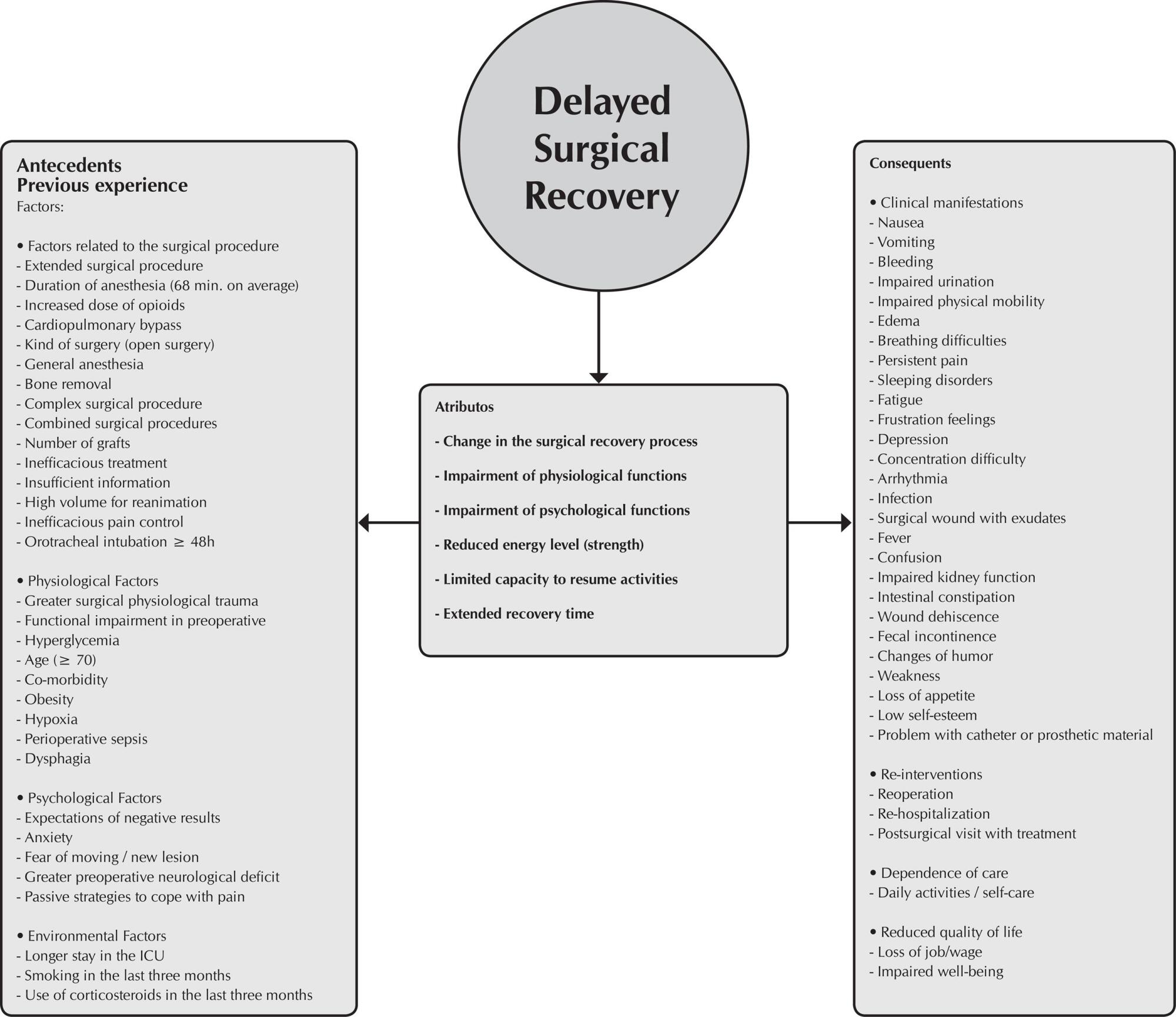
-
01-01-2015
Total Quality Management and hospital nursing: an integrative literature review
Revista Brasileira de Enfermagem. 2015;68(5):945-952
Abstract
Total Quality Management and hospital nursing: an integrative literature review
Revista Brasileira de Enfermagem. 2015;68(5):945-952
DOI 10.1590/0034-7167.2015680525i
Views0See moreABSTRACT
Objective:
to identify the available evidence in the literature on Total Quality Management in nursing administration.
Method:
integrative literature review of full text articles in Portuguese, English and Spanish, published between 2000 and 2011 in the LILACS, MEDLINE, SciELO and PubMed databases.
Results:
the sample comprises 24 periodical articles grouped by the following thematic categories: Theoretical assumptions; Practical application and Quality indicators. Despite the criticism of models derived from classic administration theories, experiences of success with the deployment of TQM have already marked the health and nursing setting in Brazil.
Conclusion:
Total Quality Management in managing of nursing care has being fully used in some health institutions, while others have adopted several of its principles. Two of the twenty four articles are intervention studies, which characterizes the necessity for clinical research in this area.
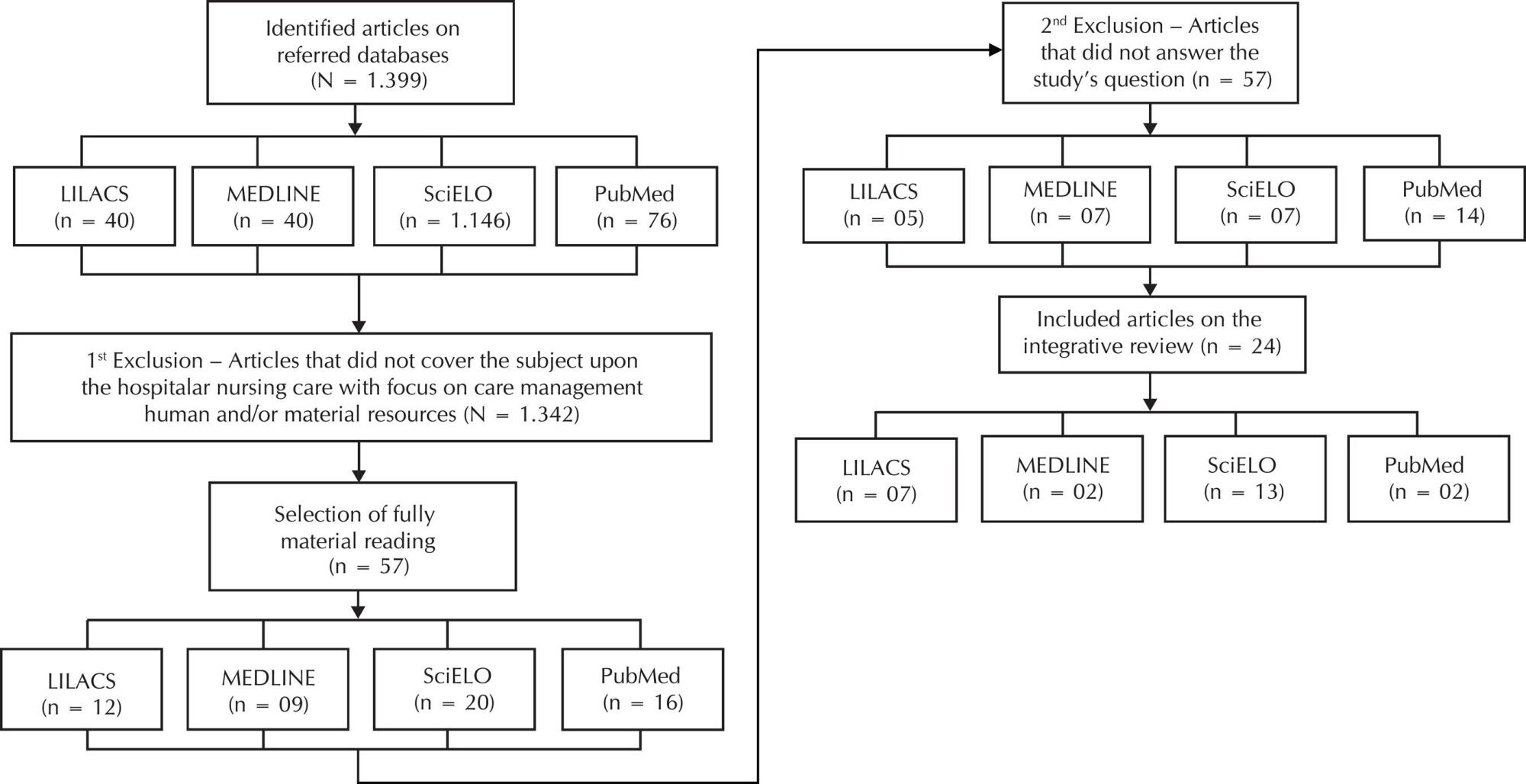
-
01-01-2015
Association between fatigue and functional capacity in patients with intermittent claudication
Revista Brasileira de Enfermagem. 2015;68(5):937-944
Abstract
Association between fatigue and functional capacity in patients with intermittent claudication
Revista Brasileira de Enfermagem. 2015;68(5):937-944
DOI 10.1590/0034-7167.2015680524i
Views0See moreABSTRACT
Objective:
to characterize fatigue and exertion fatigue in patients with intermittent claudication (IC), and to test their association with sociodemographic and clinical variables, walking capacity and level of physical activity.
Method:
forty-nine participants (66.6 years; 70% male) were studied. Validated questionnaires were used to assess fatigue (DUFS), exertion fatigue (DEFS), level of physical activity (BASIC) and walking capacity (WIQ).
Results:
participants had substantial fatigue (DUFS = 20.4+8.8) and substantial exertion fatigue (DEFS = 20.4+10.8). There was an association between the DUFS and marital status (p = 0,008). There was a statically significant association between DEFS with scores of the BASIC (r = .331; p = .02) and among DEFS with WIQ domains – walking distance (r=.359; p = .011) and climbing stairs (r=.331; p = .02).
Conclusion:
patients with IC have fatigue and exertion fatigue. Exertion fatigue might compromise the engagement of these patients in physical activity, one of the main components of IC treatment.
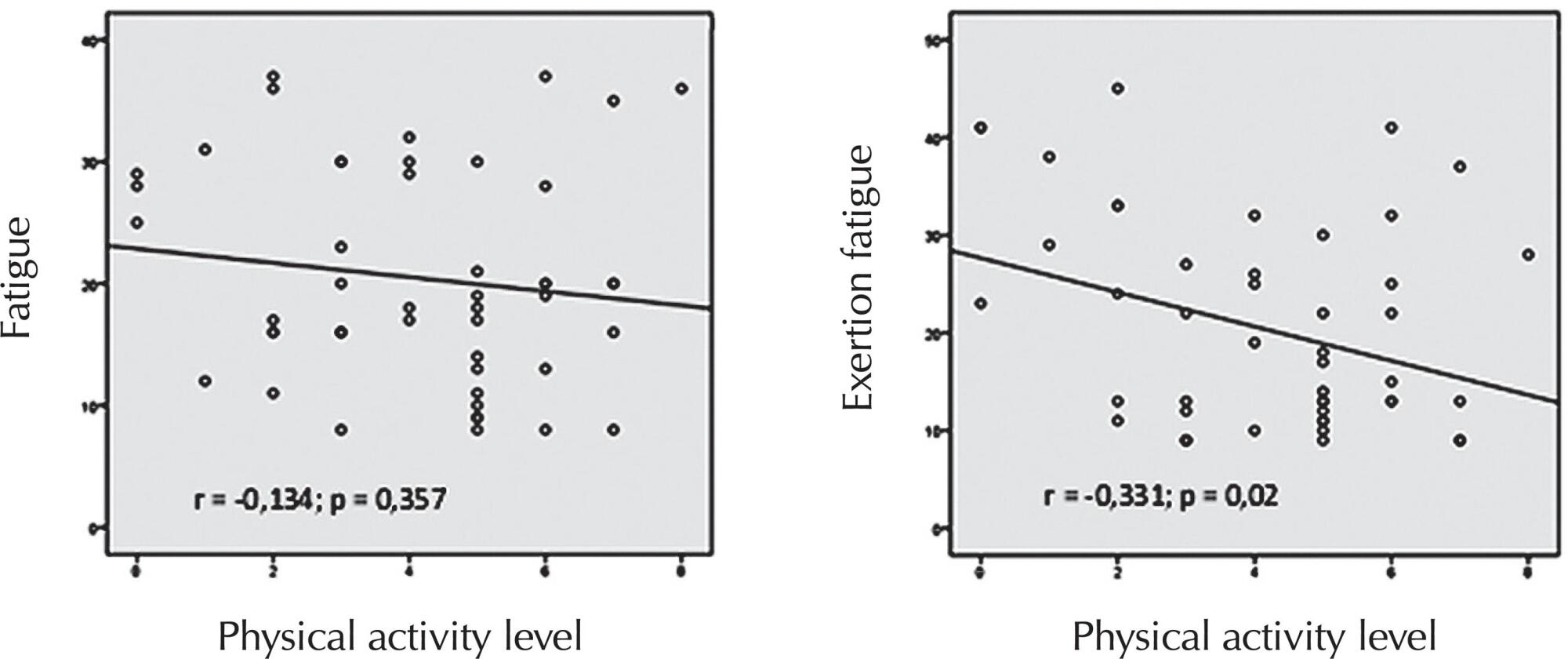
-
01-01-2015
Body mobilization for prevention of pressure ulcers: direct labor costs
Revista Brasileira de Enfermagem. 2015;68(5):930-936
Abstract
Body mobilization for prevention of pressure ulcers: direct labor costs
Revista Brasileira de Enfermagem. 2015;68(5):930-936
DOI 10.1590/0034-7167.2015680523i
Views0See moreABSTRACT
Objective:
to calculate the average total cost (ATC) on the direct labor costs (DLC) of nursing professionals in body mobilization of patients for the prevention of pressure ulcers.
Method:
this is a quantitative, exploratory and, descriptive research. We observed 656 preventive mobilizations and we calculated the cost by multiplying the time spent by professionals at a unitary DLC.
Results:
ATC with DLC for each Unit corresponded to: Medical Clinic R$ 5.38 for bed turning, R$ 5.26 for seating positions, R$ 5.55 for walking aid; Surgical Clinic R$ 2.42 for bed turning, R$ 2.30 for seating positions, R$ 2.96 for walking aid and Intensive Care Unit R$ 8.15 for bed turning, R$ 7.57 for seating positions, R$ 15.32 for walking aid.
Conclusion:
the knowledge generated can support management related to costs of human resources needed to efficiently and effectively nursing care.
-
01-01-2015
The mobilization of nurses for the non-interruption of nursing residence
Revista Brasileira de Enfermagem. 2015;68(5):923-929
Abstract
The mobilization of nurses for the non-interruption of nursing residence
Revista Brasileira de Enfermagem. 2015;68(5):923-929
DOI 10.1590/0034-7167.2015680522i
Views0See moreABSTRACT
Objective:
To analyze the strategies employed by nurses to maintain the nursing residence program at the Ophir Loyola Hospital and discuss the potential effects of this interruption on the state of Pará.
Method:
Social-historic research. Data were collected through primary sources, written documents, and oral testimonial; the secondary sources used were manuals and articles that approached the topic in question. The theoretical reference was based on the French sociologist Pierre Bourdieu’s ideas about the concepts of cultural, social, and symbolic capital, in addition to the habitus and field concepts.
Results:
During the nurses’ mobilization there was a strong political influence on the development of the crisis and the interruption of the nursing residence Program at the Ophir Loyola Hospital, with implications for the nurses’ qualifications and the health care delivered to the societyof Pará.
Conclusion:
The analysis showed the prevalence of partisan political interests at the expense of social interests, culminating in the interruption of the nursing residency.
-
ORIGINAL ARTICLE04-09-2020
Factors associated with the discontinuance of outpatient follow-up in neonatal units
Revista Brasileira de Enfermagem. 2020;73(3):e20180793
Abstract
ORIGINAL ARTICLEFactors associated with the discontinuance of outpatient follow-up in neonatal units
Revista Brasileira de Enfermagem. 2020;73(3):e20180793
DOI 10.1590/0034-7167-2018-0793
Views1See moreABSTRACT
Objectives:
to identify predisposing and enabling factors as well as the health needs associated with the discontinuance of outpatient follow-up of newborns who were hospitalized at neonatal intensive care unit.
Methods:
cross-sectional study, using the behavioral model of health services use. The study was composed of 358 mothers and newborns referred to the outpatient follow-up after discharge. Characterization, perception of social support, postnatal depression, and attendance to appointments data were collected, analyzed by the R software (3.3.1).
Results:
outpatient follow-up was discontinued by 31.28% of children in the first year after discharge. In multiple regression analysis, the chance of discontinuance was higher for newborns who used mechanical ventilation (OR = 1.68; 95%CI 1.04-2.72) and depended on technology (OR = 3.54; 95%CI 1.32-9.5).
Conclusions:
predisposing factors were associated with the discontinuance of follow-up; enabling factors and health needs did not present a significant association. Children with more complex health conditions require additional support to participate in follow-up programs, thus ensuring the continuity of care.

-
ERRATUM02-26-2024
ERRATUM
Revista Brasileira de Enfermagem. 2024;77(1):e20160061
Abstract
ERRATUMERRATUM
Revista Brasileira de Enfermagem. 2024;77(1):e20160061
DOI 10.1590/0034-7167.20247701e03
Views2In the article “Nurses in the labor market: professional insertion, competencies and skills”, with DOI number: , published in Revista Brasileira de Enfermagem, 2017;70(6):1220-6, on page 1225:Include before REFERENCES:[…]See more -
REVIEW12-08-2024
Interventions for Strengthening General Self-Efficacy Beliefs in College Students: An Integrative Review
Revista Brasileira de Enfermagem. 2024;77(1):e20230192
Abstract
REVIEWInterventions for Strengthening General Self-Efficacy Beliefs in College Students: An Integrative Review
Revista Brasileira de Enfermagem. 2024;77(1):e20230192
DOI 10.1590/0034-7167-2023-0192
Views0See moreABSTRACT
Objective:
To assess the evidence regarding the effectiveness of interventions aimed at strengthening self-efficacy beliefs in college students.
Methods:
Integrative Review conducted on the Lilacs, PubMed, CinahL, Cochrane Collaboration Databases, Scopus, and PsycInfo databases. The methodological quality of the studies was assessed using tools proposed by the Joanna Briggs Institute, and the results were analyzed descriptively.
Results:
Out of the 10 selected studies, six demonstrated that interventions aimed at strengthening self-efficacy were effective (Levels of Evidence II and III), and four revealed contrary results (Levels of Evidence I and II). Programs aimed at enhancing self-efficacy should include content on positive mental health, psychoeducation strategies, cover a period of eight to twelve weeks, and consider the completion of homework assignments.
Conclusion:
The synthesis of evidence pointed to pathways for building an effective self-efficacy strengthening program to be implemented in universities.

-
ORIGINAL ARTICLE05-13-2024
Generalized Resistance Deficits in inmates with hypertension: missing resources that limit health
Revista Brasileira de Enfermagem. 2024;77(2):e20230246
Abstract
ORIGINAL ARTICLEGeneralized Resistance Deficits in inmates with hypertension: missing resources that limit health
Revista Brasileira de Enfermagem. 2024;77(2):e20230246
DOI 10.1590/0034-7167-2023-0246
Views0See moreABSTRACT
Objective:
to understand the Generalized Resistance Deficits of people deprived of liberty with hypertension in a Brazilian prison unit.
Method:
qualitative research, anchored in Salutogenesis, carried out with 38 people with hypertension from a Brazilian prison unit, from February to July 2022, with a semi-structured interview with open-ended questions, whose analysis was thematic, explaining the limitations to health in prison.
Results:
13 Generalized Resistance Deficits were reported, mostly related to the prison environment and, to a lesser extent, to the social group and the individual, respectively. Living in prison for people with hypertension implies living with a high number of Generalized Resistance Deficits, accentuating the movement towards the disease pole.
Final considerations:
knowing Generalized Resistance Deficits allows directing health promotion to support the use of available Generalized Resistance Resources and contributes to the expansion of intersectoral policies.

-
ERRATUM06-14-2024
ERRATUM
Revista Brasileira de Enfermagem. 2024;77(2):e2024n2e05
Abstract
ERRATUMERRATUM
Revista Brasileira de Enfermagem. 2024;77(2):e2024n2e05
DOI 10.1590/0034-7167.20247702e05
Views2In the article “Educational technologies used to promote self-care for people with diabetes mellitus: integrative review”, with DOI number: , published in Revista Brasileira de Enfermagem, 2023;76(Suppl 4):e20230049, in the title:Where it read:[…]See more -
ERRATUM06-14-2024
ERRATUM
Revista Brasileira de Enfermagem. 2024;77(2):e2024n2e06
Abstract
ERRATUMERRATUM
Revista Brasileira de Enfermagem. 2024;77(2):e2024n2e06
DOI 10.1590/0034-7167.20247702e06
Views2In the article “Is there scientific relevance to the plot of films and documentaries about eating disorders?”, with DOI number: , published in Revista Brasileira de Enfermagem, 2024;77(1):e20220547, page 7:Where it read:[…]See more -
REVIEW07-29-2024
Profile of scientific production on nursing technology construction, validity and application: a bibliometric study
Revista Brasileira de Enfermagem. 2024;77(3):e20230452
Abstract
REVIEWProfile of scientific production on nursing technology construction, validity and application: a bibliometric study
Revista Brasileira de Enfermagem. 2024;77(3):e20230452
DOI 10.1590/0034-7167-2023-0452
Views1See moreABSTRACT
Objective:
to analyze the profile of scientific production on nursing technology construction, validity and application.
Methods:
this is a bibliometric study, carried out in six databases, based on the Methodi Ordinatio application, arranged in nine stages. To represent the findings, the VOSviewer® software was used.
Results:
346 studies were identified, obtained from BDENF, CINAHL, EMBASE, LILACS, PubMed/MEDLINE, Scopus and Web of Science. There was a predominance of the English language, and 20% of the authors hold more than 25% of studies. Only two journals account for 25% of studies in the period studied. Twenty-six studies were selected for the InOrdinatio classification. Nursing Process (23%) stood out among the studies. The most produced technology was software (27%), and 50% of works describe construction and validity.
Conclusions:
there is an emphasis on the creation of educational technologies, especially information technology. The data demonstrates opportunities for future research in the area.

-
ORIGINAL ARTICLE01-10-2024
Inventory of ethical problems in mobile pre-hospital care
Revista Brasileira de Enfermagem. 2024;77:e20230539
Abstract
ORIGINAL ARTICLEInventory of ethical problems in mobile pre-hospital care
Revista Brasileira de Enfermagem. 2024;77:e20230539
DOI 10.1590/0034-7167-2023-0539
Views1See moreABSTRACT
Objective:
to construct and validate the content of an inventory of ethical problems experienced by nurses in mobile pre-hospital care.
Method:
a psychometric approach study, developed with the following stages: (1) instrument construction through a theoretical matrix based on deliberative bioethics, scoping review and online qualitative research; (2) content validity by judges; (3) pre-testing with Mobile Emergency Care Service nurses in various Brazilian states. For content validity analysis, the Content Validity Ratio was calculated (CVR>0.45 for judges and CVR>0.35 for the target population).
Results:
the instrument had 44 items, distributed across four dimensions.
Final considerations:
the constructed instrument presented sources of evidence of content validity, providing good psychometric measurements and constituting a useful tool for nurses’ practice in the pre-hospital setting.

-
02-08-2021
Elder abuse: actions and suggestions by Primary Health Care professionals
Revista Brasileira de Enfermagem. 2021;74:e20200263
Abstract
Elder abuse: actions and suggestions by Primary Health Care professionals
Revista Brasileira de Enfermagem. 2021;74:e20200263
DOI 10.1590/0034-7167-2020-0263
Views0See moreABSTRACT
Objective:
to analyze the actions and suggestions of Primary Care professionals in relation to elder abuse.
Method:
this is a research with a qualitative approach based on the realization of focus groups with professionals from Primary Health Care in a city in the interior of São Paulo. The methodological stance of Hermeneutic-Dialectic thinking (HD) was adopted.
Results:
two themes were listed: Actions taken by health professionals and Suggestions for improving care for elderly victims of violence.
Final considerations:
professionals emphasized the need to implement new resources and improve the functioning of existing ones, so that comprehensive care is possible, in order to prevent and intervene in the important social and public health problem that violence represents.
-
05-21-2021
Influence of chronic pain on cognitive performance in elderly caregivers: a longitudinal study
Revista Brasileira de Enfermagem. 2021;74:e20200412
Abstract
Influence of chronic pain on cognitive performance in elderly caregivers: a longitudinal study
Revista Brasileira de Enfermagem. 2021;74:e20200412
DOI 10.1590/0034-7167-2020-0412
Views0See moreABSTRACT
Objective:
to compare cognitive performance of elderly caregivers with and without chronic pain over four years and verify the effect of pain intensity on cognitive performance of elderly caregivers with chronic pain.
Method:
a longitudinal study with data collected in 2014 and 2018. Community-dwelling elderly caregivers of a Brazilian city participated in the study. Cognition was assessed using the Addenbrooke’s Cognitive Examination instrument. Pain was assessed by an 11-point scale. For data analysis, a mixed linear model and ANCOVA with a 5% significance level were used.
Results:
they were divided into two groups. A cognitive decline over four years was found in elderly people with pain (p=0.02; 95%CI=0.32-4.25), while those without pain did not show a significant change.
Conclusion:
the results show that elderly caregivers with pain had a worse cognitive performance, but when comparing groups with the ANCOVA test for intergroup analysis, there was no difference in cognitive performance.
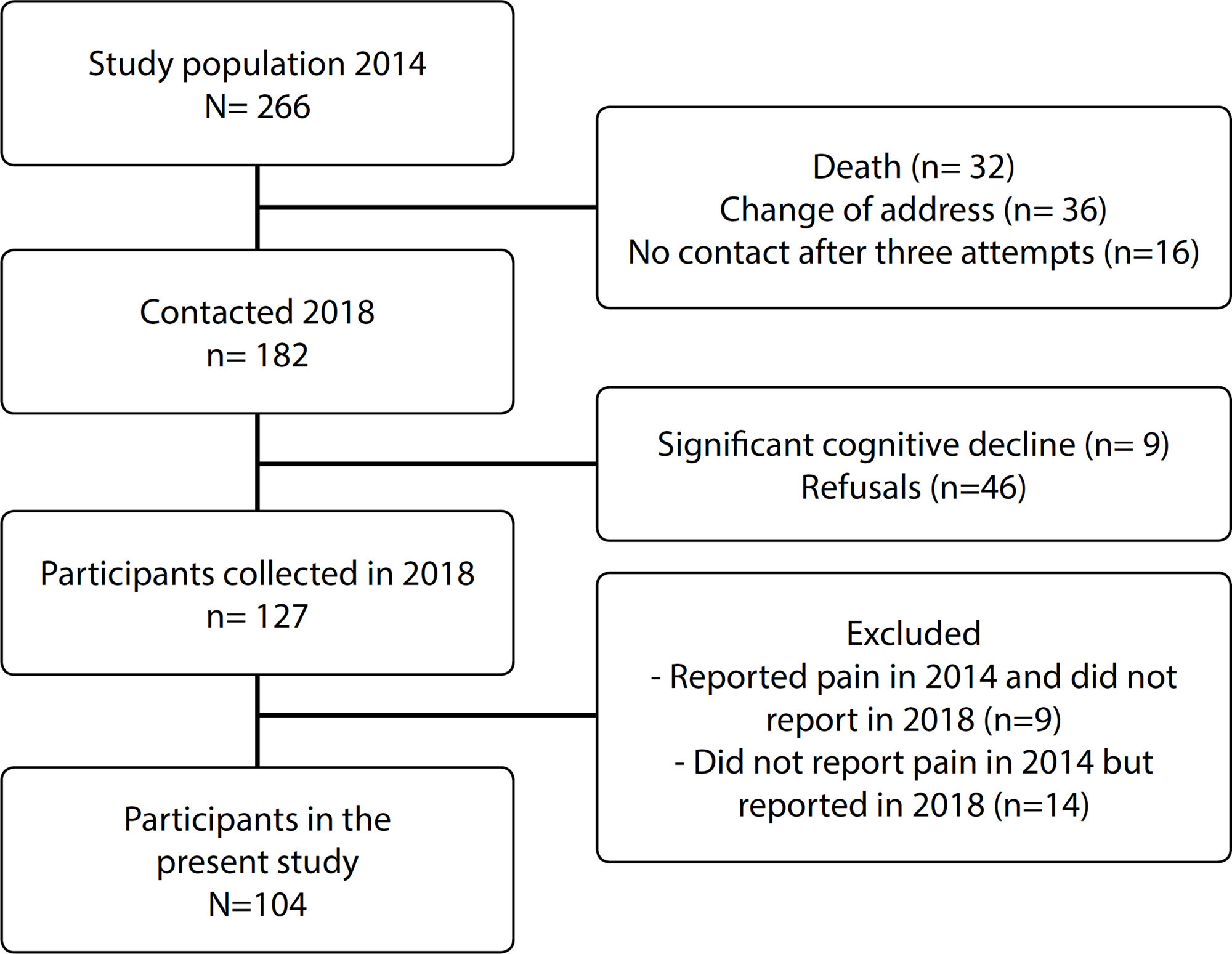
-
ORIGINAL ARTICLE12-21-2020
Comprehensive care from the perspective of nurses: an ecosystem approach
Revista Brasileira de Enfermagem. 2020;73:e20190781
Abstract
ORIGINAL ARTICLEComprehensive care from the perspective of nurses: an ecosystem approach
Revista Brasileira de Enfermagem. 2020;73:e20190781
DOI 10.1590/0034-7167-2019-0781
Views1See moreABSTRACT
Objectives:
to verify nurses’ perceptions about comprehensive care to human beings from the ecosystem perspective, with Therapeutic Touch use.
Methods:
an exploratory-descriptive, qualitative study, conducted with 11 nurses who use/used Therapeutic Touch in daily work. Data were collected through online semi-structured interviews and submitted to discursive textual analysis. The ecosystem framework was used.
Results:
participants talked about the theme in a polysemic way, but understand that comprehensive care is associated with nursing professionals and intrinsic in their being and doing, considering the philosophical theoretical bases of nursing, which aim at the comprehensiveness of being.
Final Considerations:
Therapeutic Touch was considered as a way to achieve comprehensive care caring to human being ins. The objective of the study was achieved; however, it is understood the need for other research to advance this knowledge and enable innovations in professional practice of nurses.
-
02-12-2021
(Lack of) oral hygiene care for hospitalized elderly patients
Revista Brasileira de Enfermagem. 2021;74:e20200415
Abstract
(Lack of) oral hygiene care for hospitalized elderly patients
Revista Brasileira de Enfermagem. 2021;74:e20200415
DOI 10.1590/0034-7167-2020-0415
Views0See moreABSTRACT
Objective:
to analyze the oral hygiene care for hospitalized elderly patients provided by the nursing staff.
Method:
this is a qualitative, exploratory-descriptive study carried out in a university hospital, with the participation of 35 professionals from the nursing staff. Data collection was carried out through semi-structured interviews, explored through thematic content analysis.
Results:
two categories emerged: The oral hygiene of hospitalized elderly patients as an extension of body care and Barriers in (lack of) care with the oral hygiene of hospitalized elderly patients, with two subcategories: The oral hygiene and dental prosthesis technique performed divergently; Care hampered by deficit of materials and human resources.
Final considerations:
this study showed weaknesses in the oral hygiene care of hospitalized elderly patients, promoting reflections on the practice informed in data and management actions, allowing recommendations of care standards for the nursing staff.
-
ORIGINAL ARTICLE12-21-2020
Terms of specialized nursing language for chronic renal patients undergoing conservative treatment
Revista Brasileira de Enfermagem. 2020;73:e20190820
Abstract
ORIGINAL ARTICLETerms of specialized nursing language for chronic renal patients undergoing conservative treatment
Revista Brasileira de Enfermagem. 2020;73:e20190820
DOI 10.1590/0034-7167-2019-0820
Views0See moreABSTRACT
Objectives:
to validate the terms of the specialized nursing language used in the care of people with chronic kidney disease undergoing conservative treatment identified in the literature by mapping them with terms of the International Classification for Nursing Practice, version 2019, and representing them by means of a mandala.
Methods:
descriptive, documentary and methodological study. The terms were collected in 53 scientific articles, standardized and mapped with the terminology. The validation was performed by six nurses through a focus group. The Content Validity Index was used and terms with a value ≥ 0.80 were validated.
Results:
the normalization resulted in 957 relevant terms, of which 499 were constant and 458 not included in the terminology. Terms were validated when Content Validity Index was between 0.86 and 1.0.
Conclusions:
the study allowed the validation of terms that will contribute to unify the professional language of nursing in the care of people with chronic kidney disease.

-
05-21-2021
Factors associated with quality of life of older adults with chronic pain
Revista Brasileira de Enfermagem. 2021;74:e20200554
Abstract
Factors associated with quality of life of older adults with chronic pain
Revista Brasileira de Enfermagem. 2021;74:e20200554
DOI 10.1590/0034-7167-2020-0554
Views0See moreABSTRACT
Objective:
To analyze the factors associated with quality of life of the older adults with chronic pain.
Method:
Cross-sectional study conducted with 239 older adults in outpatient care in the state of Goiás, Brazil. The World Health Organization Quality of Life–Old (WHOQOL-OLD) instrument contains six domains and was applied to assess quality of life. Simple and multiple linear regressions were used in the statistical analysis.
Results:
The factors associated with Sensory Abilities were age (β = – 0.52), time spent together (β = – 14.35; – 17.86; – 15.57), and pain intensity (β = – 1, 70). Autonomy was associated with depression (β = – 5.99) and chest pain (β = – 6.17). Social participation related to schooling (β = – 0.64), diabetes mellitus (β = – 8.15), depression (β = – 14.53), pain intensity (β = – 1.43), and lower limb pain (β = – 5.94). Past, present and future activities related to depression (β = – 6.94). Death and dying related to hypertension (β = – 8.40), while Intimacy to depression (β = – 5.99) and headache/face pain (β = – 3.19).
Conclusion:
The time experiencing chronic pain and the location of this experience, as well as depression, diabetes and systemic arterial hypertension were factors that had greater influence on the older adult’s Quality of Life domains.
-
REVIEW09-06-2022
Religiosity and mental health as aspects of comprehensiveness in care
Revista Brasileira de Enfermagem. 2022;75(1):e20201011
Abstract
REVIEWReligiosity and mental health as aspects of comprehensiveness in care
Revista Brasileira de Enfermagem. 2022;75(1):e20201011
DOI 10.1590/0034-7167-2020-1011
Views0See moreABSTRACT
Objective:
to understand how religiosity can influence the health of individuals diagnosed with mental disorders, based on comprehensive care.
Methods:
this is an integrative literature review, with the inclusion of articles in Portuguese, English and Spanish, between 2010 and 2018.
Results:
the critical analysis and qualitative synthesis of the 24 selected studies were categorized into two subtopics: The influence of religiosity in promoting comprehensive mental health care; Mental health versus religiosity: influencing conditions for effective access to comprehensive care.
Final considerations:
a positive influence of religiosity was identified in the lives of individuals diagnosed with mental disorders; however, evidence shows that health teams do not feel comfortable and prepared to work with religiosity as an expression of spirituality. This being one of the dimensional aspects of health, it can be inferred, on the results, the existence of this gap in the comprehensive care approach.
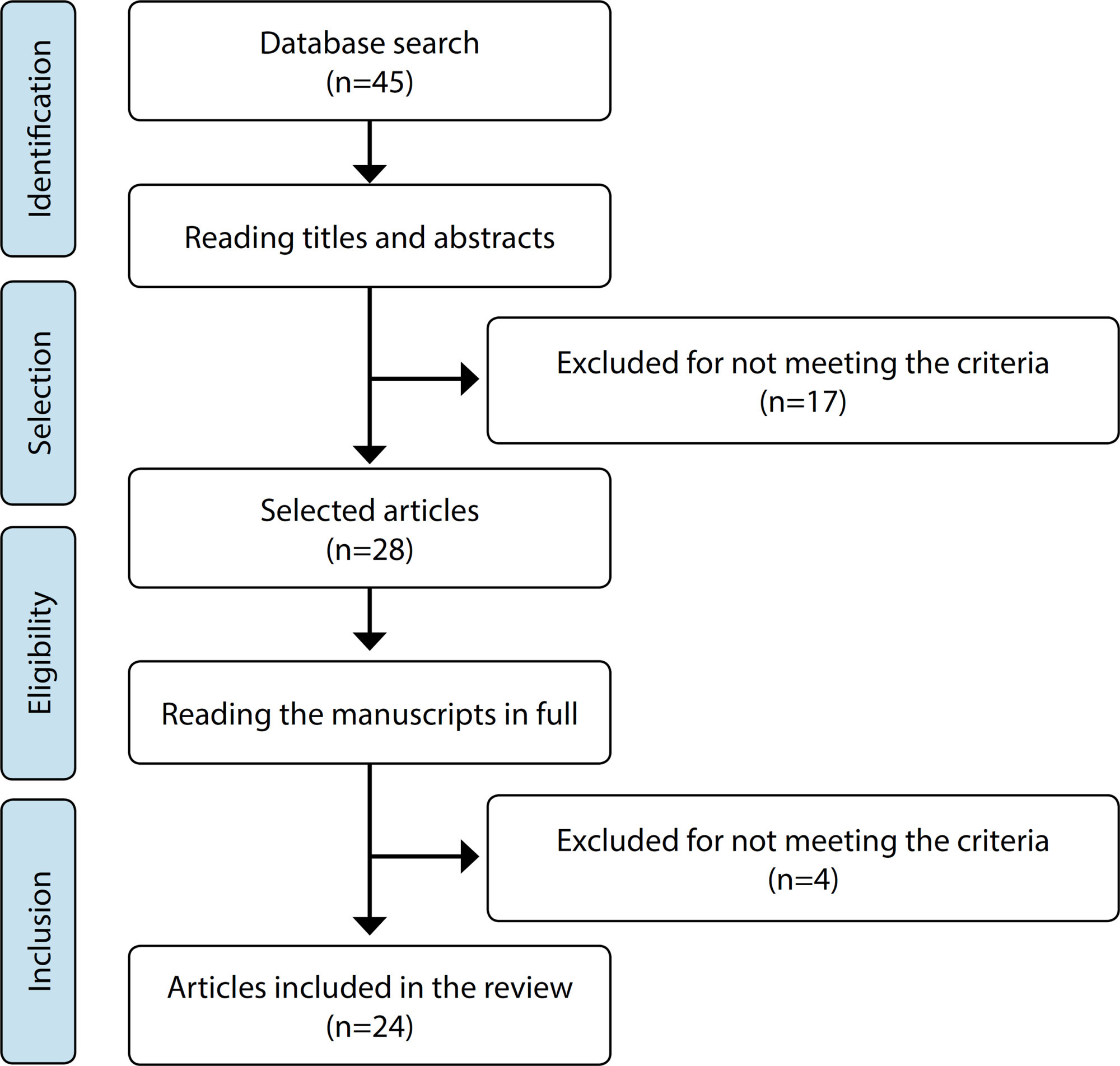
-
ORIGINAL ARTICLE05-03-2021
Implementation of a surgical safety checklist in Brazil: cross-sectional study
Revista Brasileira de Enfermagem. 2021;74(2):e20190874
Abstract
ORIGINAL ARTICLEImplementation of a surgical safety checklist in Brazil: cross-sectional study
Revista Brasileira de Enfermagem. 2021;74(2):e20190874
DOI 10.1590/0034-7167-2019-0874
Views0See moreABSTRACT
Objective:
to identify the implementation process of the World Health Organization Surgical Safety Checklist in Brazilian hospitals.
Methods:
this is a cross-sectional study with 531 participants during a Congress of Perioperative Nursing, promoted by the Brazilian Association of Operating Room Nurses, Anesthetic Recovery and Material and Sterilization Center, in 2017.
Results:
among the nursing professionals included, 84.27% reported the checklist implementation in the workplace. Regarding daily application in the Sign-in stage, 79.65% of professionals confirmed patient identification with two indicators; in the Time-out stage, 51.36% of surgeries started regardless of confirmation of one of the items. In the Sign-out stage, 69.34% of professionals did not count or occasionally counted the surgical instruments and suture needles, and only 36.36% reviewed concerns about postoperative recovery.
Conclusion:
this study identified needs for improvements in applying the checklist in the Brazilian reality, to guarantee safer surgical procedures.
Search
Search in:
Nuvem de Tags
Adolescente (85) Atenção Primária à Saúde (239) COVID-19 (91) Criança (91) Cuidados de Enfermagem (269) Educação em Enfermagem (151) Educação em Saúde (139) Enfermagem (930) Enfermagem Pediátrica (86) Estudantes de Enfermagem (77) Estudos de Validação (131) Família (87) Idoso (208) Promoção da Saúde (99) Qualidade de Vida (104) Saúde do Trabalhador (86) Saúde Mental (145) Saúde Pública (82) Segurança do Paciente (150) Tecnologia Educacional (100)



